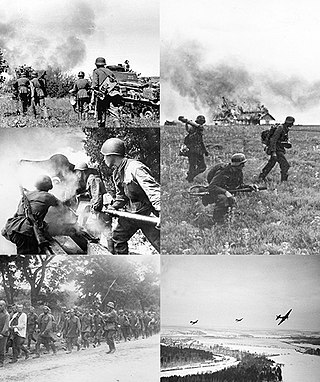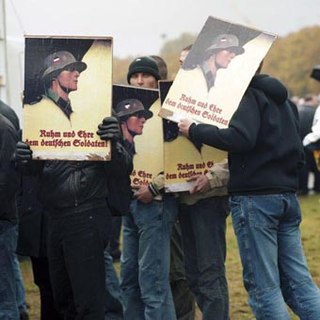Related Research Articles

The Final Solution or the Final Solution to the Jewish Question was a Nazi plan for the genocide of individuals they defined as Jews during World War II. The "Final Solution to the Jewish question" was the official code name for the murder of all Jews within reach, which was not restricted to the European continent. This policy of deliberate and systematic genocide starting across German-occupied Europe was formulated in procedural and geopolitical terms by Nazi leadership in January 1942 at the Wannsee Conference held near Berlin, and culminated in the Holocaust, which saw the murder of 90% of Polish Jews, and two-thirds of the Jewish population of Europe.

Operation Barbarossa was the invasion of the Soviet Union by Nazi Germany and many of its Axis allies, starting on Sunday, 22 June 1941, during the Second World War. It was the largest and costliest land offensive in human history, with around 10 million combatants taking part, and over 8 million casualties by the end of the operation.

The Generalplan Ost, abbreviated GPO, was Nazi Germany's blueprint for the genocide, extermination and large-scale ethnic cleansing of Slavs, Eastern European Jews, and other indigenous peoples of Eastern Europe categorized as "Untermenschen" in Nazi ideology. The campaign was a precursor to Nazi Germany's planned colonisation of Central and Eastern Europe by Germanic settlers, and it was carried out through systematic massacres, mass starvations, chattel labour, mass-rapes, child abductions, and sexual slavery.

The Commissar Order was an order issued by the German High Command (OKW) on 6 June 1941 before Operation Barbarossa. Its official name was Guidelines for the Treatment of Political Commissars. It instructed the Wehrmacht that any Soviet political commissar identified among captured troops be summarily executed as a purported enforcer of the so-called Judeo-Bolshevism ideology in military forces. It is one of a series of criminal orders issued by the Nazi leadership.

Arthur Nebe was a German SS functionary who held key positions in the security and police apparatus of Nazi Germany and was, from 1941, a major perpetrator of the Holocaust.

Reichskommissariat Moskowien was the civilian occupation-regime that Nazi Germany intended to establish in central and northern European Russia during World War II, one of several similar Reichskommissariate. It was also known initially as the Reichskommissariat Russland, but was later renamed as part of German policies of partitioning the Russian state. Siegfried Kasche was the projected Reichskomissar, but due to the Wehrmacht's failure to occupy the territories intended to form the Reichskommissariat, it remained on paper only.

During World War II, the German Wehrmacht committed systematic war crimes, including massacres, mass rape, looting, the exploitation of forced labour, the murder of three million Soviet prisoners of war, and participated in the extermination of Jews. While the Nazi Party's own SS forces was the organization most responsible for the genocidal killing of the Holocaust, the regular armed forces of the Wehrmacht committed many war crimes of their own, particularly on the Eastern Front.
The Hunger Plan was a partially implemented plan developed by Nazi bureaucrats during World War II to seize food from the Soviet Union and give it to German soldiers and civilians. The plan entailed the genocide by starvation of millions of Soviet citizens following Operation Barbarossa, the 1941 invasion of the Soviet Union. The premise behind the Hunger Plan was that Germany was not self-sufficient in food supplies; to sustain the war and keep up domestic morale, it needed food from conquered lands at any cost. The plan created a famine as an act of policy, killing millions of people.

During World War II, Soviet prisoners of war (POWs) held by Nazi Germany and primarily in the custody of the German Army were starved and subjected to deadly conditions. Of nearly six million that were captured, around three million died during their imprisonment.
Hans Christian Gerlach is professor of Modern History at the University of Bern. Gerlach is also Associate Editor of the Journal of Genocide Research and author of multiple books dealing with the Hunger Plan, the Holocaust, and genocide.

The Holocaust in Ukraine was the systematic mass murder of Jews in the Reichskommissariat Ukraine, the General Government, the Crimean General Government and some areas which were located to the East of Reichskommissariat Ukraine, in the Transnistria Governorate and Bessarabia, Northern Bukovina and the Hertsa region and Carpathian Ruthenia during World War II. The listed areas are currently parts of Ukraine.
David Stahel is a historian, author and senior lecturer in history at the University of New South Wales. He specialises in German military history of World War II. Stahel has authored several books on the military operations of the first six months of the Eastern Front, including on the launching of Operation Barbarossa, the Battle of Kiev (1941) and the Battle for Moscow.
Hans-Joachim Riecke or Hans-Joachim Ernst Riecke was a German Nazi politician and Gruppenführer in the SS. During World War II Riecke was the State Secretary (Staatssekretär) to Herbert Backe, the Reichsminister of Food and Agriculture. He was Backe's accomplice in planning and implementing the Hunger Plan which resulted in the death by starvation of millions of people in the Soviet Union.

The myth of the clean Wehrmacht is the negationist notion that the regular German armed forces were not involved in the Holocaust or other war crimes during World War II. The myth, heavily promoted by German authors and military personnel after World War II, completely denies the culpability of the German military command in the planning and perpetration of war crimes. Even where the perpetration of war crimes and the waging of an extermination campaign, particularly in the Soviet Union – where the Nazis viewed the population as "sub-humans" ruled by "Jewish Bolshevik" conspirators – has been acknowledged, they are ascribed to the "Party soldiers corps", the Schutzstaffel (SS), but not the regular German military.
Felix Römer is a German historian who specialises in the history of World War II. He has conducted pioneering research into the implementation of the Commissar Order by combat formations of the Wehrmacht and the attitudes of German soldiers based on the surreptitiously recorded conversations of prisoners of war held in Fort Hunt, Virginia, United States.

In German military history, Bandenbekämpfung, also referred to as Nazi security warfare during World War II, refers to the concept and military doctrine of countering resistance or insurrection in the rear area during wartime with extreme brutality. The doctrine provided a rationale for disregarding the established laws of war and for targeting any number of groups, from armed guerrillas to civilians, as "bandits" or "members of gangs". As applied by the German Empire and later Nazi Germany, it became instrumental in the crimes against humanity committed by the two regimes, including the Herero and Nama genocide and the Holocaust.
A war of annihilation or war of extermination is a type of war in which the goal is the complete annihilation of a state, a people or an ethnic minority through genocide or through the destruction of their livelihood. The goal can be outward-directed or inward, against elements of one's own population. The goal is not like other types of warfare, the recognition of limited political goals, such as recognition of a legal status, control of disputed territory, or the total military defeat of an enemy state.
Heinz Magenheimer is an Austrian military historian known for advancing the now discredited theory of a preemptive strike by the Wehrmacht against the Soviet Union.
In historiography and genocide studies, cumulative radicalization is the notion that genocide and other mass crimes are not planned long in advance, but emerge from wartime crises and a process of radicalization. Originally coined by German historian Hans Mommsen with regard to the functionalist view of the Holocaust, in his 1976 essay "National Socialism: Cumulative Radicalization and the Regime’s Self-Destruction". The concept has also been applied to the Armenian genocide.

Keine Kameraden. Die Wehrmacht und die sowjetischen Kriegsgefangenen, 1941–1945 is a book by German historian Christian Streit first published in 1978. Streit concluded that of 5.7 million Red Army soldiers taken captive by Nazi Germany, 3.3 million died of "ideologically motivated mishandling"—findings which caused a sensation in Germany when first published. It was the first major study on the topic and has been described as "landmark", a "major breakthrough", and by Mark Edele as "the gold standard against which later accounts have to be judged". In 1980, one reviewer wrote that the book "necessitates revision—more or less—to all previous books on the Russo-German war". The book had a major impact on the historiography of Nazi Germany and particularly the war crimes of the Wehrmacht, and was followed by other books exposing the ideological inclination and criminal behavior of the Wehrmacht.
References
- ↑ See the Q & A with Dr Alex J. Kay on Nazi Germany at Explaining History Archived 18 April 2014 at the Wayback Machine .
- ↑ Wigbert Benz: Rezension zu Alex J. Kay, Exploitation, Resettlement, Mass Murder. Political and Economic Planning for German Occupation Policy in the Soviet Union, 1940–1941. In: Archiv für Sozialgeschichte online, No. 48, 2008.
- ↑ Journal of Contemporary History. Vol. 42, 2007, No. 3, p. 420. The prize winners are listed here.
- ↑ The English Historical Review. Vol. 129, Issue 539 (August 2013), pp. 1006–1007, here p. 1007.
- ↑ Ulrich Baumann and Magnus Koch (eds.), "Was damals Recht war..." – Soldaten und Zivilisten vor Gerichten der Wehrmacht. be.bra verlag, Berlin 2008, p. 258. ISBN 978-3-89809-079-7. The locations to date of the travelling exhibition are listed here.
- ↑ An article on the exhibition can be found here.
- ↑ "Viele zehn Millionen Menschen werden überflüssig". In: Frankfurter Allgemeine Zeitung, 13 June 2007, p. N 3.
- ↑ Kontraproduktives Morden. In: Süddeutsche Zeitung, 18 January 2010, p. 14.
- ↑ Falsche Helden. In: Der Tagesspiegel, 2 January 2013, p. 23.
- ↑ Hungertod nach Plan. In: der Freitag, 23 January 2009, p. 11. Chronik eines angekündigten Mordes. In: der Freitag, 18 March 2010, p. 12. Der sichere Tod. In: der Freitag, 25 July 2010, p. 12. Ist die Reichskriegsflagge verboten?. In: der Freitag. Community, 6 August 2012.
- ↑ Dr. Alex Kay's page at the University of Potsdam and faculty prospectus.